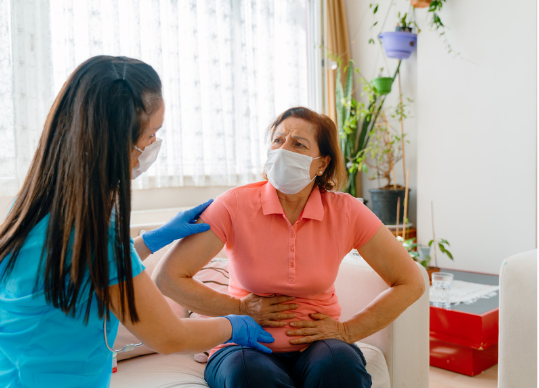
10 Negative Thoughts To Ditch Around Food And Your Body

Harsh thoughts around food and your body can creep in at any time which can negatively impact your eating patterns and hinder your weight loss goals. Here are 10 thoughts that we encourage you to lay to rest and switch your mindset to avoid sabotaging your eating habits and health goals.
1. I am bad if I eat “bad” foods and good if I eat “good” foods
Let’s be clear, while certain foods may have more nourishing effects on your body, no morality should ever be attached to your food choices. You are a good person regardless of whether you had a salad for lunch or McDonalds.
2. I already ate something “bad” today so I might as well keep eating “off plan” for the rest of the day
This is a thought that I will admit getting stuck in often. The best analogy I ever heard around this was if you have one flat tire, are you going to go ahead and slash your other 3 tires? Put it behind you, move on, and make a nourishing choice at your next meal. One “bad” meal or snack is not going to have you waking up 10 pounds heavier the next day.
3. My diet starts tomorrow, or Monday…you know the drill
As soon as you tell yourself that you are starting a “diet” or new program, your brain will anticipate restriction and go into survival mode craving all of the foods that you are planning to restrict or eliminate. If you promise yourself that you are ruling out sugar FOREVER, I will promise you sugar will be all that you crave.
4. Carbs are “bad”
This is such a myth and while subsisting on sugary carbs, bagels and pasta may not leave you feeling energized throughout the day, incorporating carbohydrates such as quinoa and sweet potatoes daily is so important as we derive a lot of our energy from these foods. More importantly is getting a balance of all macronutrients (fat, protein and carbohydrates) each day
5. I am not “allowed” to eat after a certain time at night…
With Intermittent Fasting gaining popularity, there is definitely research to support the benefits of going at least 12 hours without eating, especially for adequate digestion. However, more importantly is learning to tune into your body cues and if you are starving past the time you have set as your cut off for the day, don’t deprive yourself. And learn from that…maybe you didn’t eat enough throughout the day. I am not encouraging eating late at night but rather emphasizing the importance of tuning inwards rather than your eating cues being dictated by the clock.
6. I am never going to eat sugar again
I mean you do you!! If you truly believe that you can live your life without EVER having a piece of birthday cake or sharing a dessert with your hubby on date night again, I would never stand in your way. If you want to be more realistic, strive for balance and just remember that the DOSE MAKES THE POISON. And this relates to #3 where as soon as you implement strict restriction, your brain with physiologically crave that item even more.
7. My value is determined by the number on a scale
My best advice, get rid of your scale. I have not stepped on mine longer than I can remember and it is quite liberating. I know as soon as I do, I go back to having my mood for the day being dictated by that number. This is tied in to the need for external validation. If you are eating and moving your body in a way that makes you feel good, why should an arbitrary number on the scale change how you feel about yourself?
8. I will love myself when I fit into my old pair of jeans or get down to a size X…
I talk about this a lot and when you are so used to speaking to yourself this way, it is hard to shift. However, withholding love from yourself until you are a certain size will never get you closer to your goals. It will keep you stuck in shame and self-hatred and less likely to even want to take care of yourself. Going from self-loathing to self-love I recognize is a huge jump…start small by spending time each day appreciating parts of your body and extending gratitude towards those parts. For example, I have always hated my arms and it would be a HUGE stretch for me to wake up tomorrow and start saying that I love them. However, I can start appreciating them for allowing me to carry heavy groceries into the house or being able to do a tough upper body workout.
9. I ate so poorly today I need to have a crazy intense workout
No, no, no!!! Workout because it feels good to move your body, and you want to be strong and keep your heart healthy. When you start to see working out as a form of punishment or a rite of passage to “earn” certain foods, you will begin to resent it. By all means, if moving your body after a huge meal makes you feel good because it gets your blood flowing than I think that is great. But be honest with yourself about why you are working out and make sure that your motivation is coming from the right place.
10. I am going to wear sweats and baggy shirts until I feel good about my body
Again, this is a thought that often resonates with me. When you don’t feel comfortable in your skin, you are less apt to want to wear more form fitting clothes. But putting on outfits that you feel good in will make you feel more confident with how you show up in the world and more motivated to continue to take care of yourself in mind, body and spirit.
HIDDEN STRESSORS YOU MIGHT BE BRINGING TO THE TABLE
We all intuitively know that living in a state of stress can negatively impact both our physical and mental health. That being said, telling a stressed person to relax is the same as telling an anxious person to calm down. EASIER SAID THAN DONE!
Yet if you have goals around weight loss, improving your digestion, or increasing your energy, your stress might be very well be one of your roadblocks. And it might not be stress in the traditional sense of the word. When your body is in a state of stress, what most of us know as FIGHT, FLIGHT or FREEZE, a switch in your brain is turned off. In turn, digestion, including assimilation of nutrients, calorie burning capacity, and ability to burn fat are halted. And the release of hormones such as cortisol and insulin occurs, as well as increased levels of inflammation which can all contribute to weight gain.
Here are 3 stressors that you might not even be aware you are bringing to the table:
1. Eating quickly
We are all guilty of it. Instead of planning our day around lunch, we find a couple of minutes to squeeze it in and likely while we are distracted with scrolling, working, or watching television. Scarfing down everything on our plate in record time will put our bodies into the state of stress described above.An action step you can try immediately would be to choose one meal and give yourself 5 extra minutes to eat it. Put your utensils down between bites. This will give your body a chance to get into a more relaxed state, which is more ideal for digestion.
2. Food deprivation
If you have ever followed any type of diet, you have likely eliminated various foods and/or food groups. Or skipped meals, thinking that if you only eat from 2pm onward, you can reduce your calorie consumption for the day. Again, this exercise will prove futile every time. When your body finally gets fed, it will feel so stressed as it doesn’t know when the next meal will be coming. And it will hold on to whatever you feed it, possibly causing unwanted symptoms such bloating, gas, or weight gain. My tip around this is to avoid skipping meals. Our bodies ability to burn calories follows the sun and peaks midday. Which is why you are better off eating larger amounts earlier in the day and not piling all your food into the late afternoon and evening. Feeding your body regularly throughout the day also allows it to feel more relaxed, instead of stressed about when the next meal might come.
3. Body shame
How many times have you stared down at your stomach as you are eating feeling yucky about how big it looks to you and almost feeling ashamed for continuing to consume food? And spending every meal and snack time consumed by wanting to change how you look. Simply thinking these thoughts while you are eating can also put your body into a state of stress, which we have determined is not ideal. Take a few minutes to journal about some of these thoughts to get them out of your head onto paper. Then try to spend some time noting what you appreciate about how your body SERVES you. At your next meal, focus on these more empowering thoughts instead of the negative ones.
There are several other stressors that might be showing up when you eat. My overarching advice is to sit down to every meal as relaxed as possible. Take 3 deep cleansing breaths before you eat and put on some relaxing music. Try it out and I would love to hear how it goes for you.
By Jodi Katzin
Registered OT and Eating Psychology Coach









